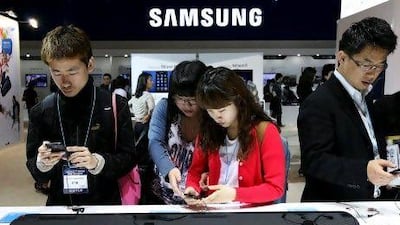Apple is now facing increasingly lethal competition in the smartphone market from Far Eastern manufacturers Samsung and HTC.
Rivalry among global smartphone makers is growing rapidly as more people opt for mobile phones with advanced features such as video entertainment. According to Forrester, an international research firm, smartphones are going mainstream, with penetration already approaching 25 per cent in the US and some European countries.
This is set to benefit both UAE customers and mobile operators du and Etisalat. Shoppers and mobile operators will be offered better deals by manufacturers anxious to win smartphone market share from the iPhone.
When the computer and electronics manufacturer launched its first iPhone smartphone at the beginning of 2007 it quickly dislodged existing market leaders such as the Finnish phone-making giant Nokia. Apple's new lead also enabled it to strike advantageous deals with mobile operators. Telecommunications companies that wanted to be the first to offer customers the iPhone were obliged to sign the Apple contract with relatively little negotiation.
But now Apple's rivals have closed the technological gap with the iPhone and are selling smartphones at a faster rate than Apple. After its mobile phone partnership deal with Apple's arch-rival Microsoft, Nokia is also now manufacturing smartphones to rival the iPhone.
"It is no longer iPhone's market," says Nick Dillon, an analyst at the international research company Ovum. "While Apple caught many handset manufacturers off guard with the launch of the iPhone four years ago, most have since managed to catch up and now offer comparable products."
Even Apple's wide choice of services and applications is being mirrored by rivals such as Samsung and HTC, which make smartphones powered by Google's Android operating system.
"Most of the top-tier smartphones offer similar capabilities to the iPhone with regards to applications, camera, maps and web browsing," says Mr Dillon.
Samsung's smartphone, Galaxy S II, is seeing faster adoption rates than the iPhone, which is now experiencing a comparatively slow sales growth.
"Major competitors include Samsung, whose Galaxy II sales are reported to have increased fivefold since April of this year reaching around 10 million while iPhone sales only grew by roughly 125 per cent," says Mr Dillon.
"Other competitors include HTC, which has done well in western Europe and the US. The wholesale prices of the latest Android smartphones are considerably less than that of the iPhone."
A key disadvantage Apple faces when competing with phone makers such as Samsung and HTC is its corporate strategy of developing its own operating system. Although the fact that Apple manufactures its own hardware and software appeals to some of its customers, it means Apple cannot quickly switch between operating systems in the same way its rivals can.
Samsung is free to choose from a growing number of rival operating systems and is now manufacturing different smartphones powered by operating systems developed by both Google and Microsoft in addition to its own in-house system.
Microsoft, which makes the Windows operating system that runs most of the world's personal computers, has developed a version of its Windows operating system especially for smartphones and also signed a partnership deal to supply a smartphone operating system to Apple's smartphone rival Nokia.
"It would also be unwise to underestimate the strengths of the Microsoft and Nokia partnership," says Mr Dillon. "Nokia has just adopted Microsoft's operating system Windows Phone for its smartphones."
Together, Microsoft and Nokia make a formidable team. Microsoft has long experience in selling software to hardware makers and Nokia has a global distribution channel second to none in the mobile phone market.
"Nokia has considerable experience in selling high-quality phones into the retail channel on a global basis," says Mr Dillon. "Microsoft has also learnt enough from past errors of judgement not to interfere too much with the marketing and retailing of Windows Phones, instead entrusting this to its operator and hardware partners."
Microsoft is also supplying its Windows Phone software to other manufacturers including Samsung. This month, Samsung is expected to unveil a smartphone running on the latest version of Microsoft's Windows Phone operating systems, referred to as Mango.
This month may also see the launch of Samsung's new version of its fast-selling Galaxy S II smartphone. There are also reports that Apple is planning to launch a new version of its smartphone, the iPhone 5.
The coming global battle of the smartphones is therefore likely to start taking place before the end this year. In the UAE, this is likely to have far-reaching effects not only for customers but for the mobile telecoms industry in general.
"As a result of increased competition between smartphone makers, consumers in countries such as the UAE will benefit from lower prices and enhanced services," predicts Mr Dillon. "Local mobile operators such as Etisalat and du may also find that Apple cannot continue to use the perceived exclusivity of the iPhone to strike deals with operators that may be non-advantageous to them in the long-term."

